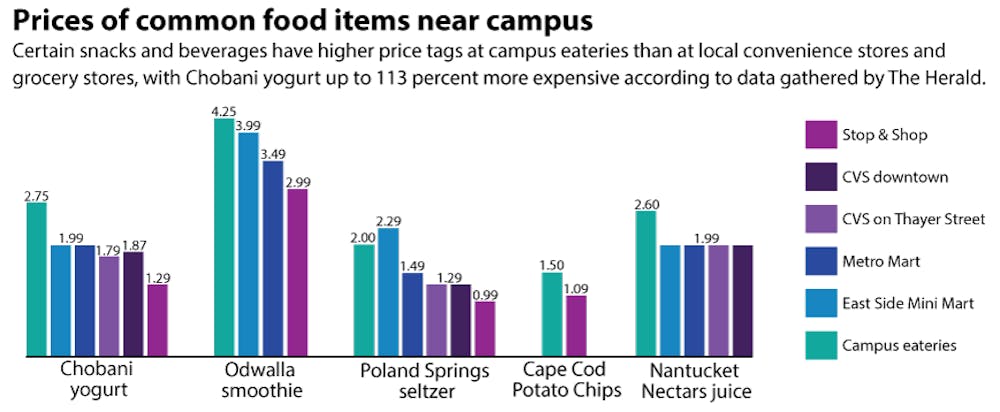The prices of certain food items are up to 113.2 percent higher at campus eateries than at convenience and grocery stores on College Hill and downtown, according to data gathered by The Herald.
Campus eateries charge more than nearby stores for at least four third-party goods: Chobani yogurt, Odwalla smoothies, Cape Cod Potato Chips and Nantucket Nectars juice.
The Herald checked the prices of these goods at East Side Mini Mart, Metro Mart, Stop and Shop, the CVS on Thayer Street and the CVS by Kennedy Plaza.
A Chobani yogurt costs $2.75 at campus eateries compared to $1.29 at Stop and Shop, marking a 113.2 percent difference. An Odwalla smoothie costs $4.25 at campus eateries — a 42.1 percent increase from the $2.99 price tag at Stop and Shop.
But campus eateries do not charge the highest prices relative to nearby stores for all items. Poland Springs sparkling water costs $2.00 on campus compared to $2.29 at East Side Mini Mart.
This difference in prices could be attributed to several factors, wrote John Friedman, associate professor of economics and international and public affairs, in an email to The Herald.
“First, it may just be more costly to get the item and sell it,” Friedman wrote. “For instance, CVS may benefit from a large-scale distribution network that the Brown campus does not have,” he wrote.
As a larger store, CVS can spread the cost of operations such as a manager salary and rent across more goods than a smaller store like the Blue Room, Friedman wrote.
In addition, many businesses can afford to use “loss leaders,” or goods that are marked down to lure customers into the store, he added.
Roshan Baral, owner of Metro Mart, said his store on Thayer Street sees a lot of business from Brown students, adding that he believes many Brown students turn to buying groceries off campus.
In pricing items at Metro Mart, the final cost depends on the category of the good, but groceries are usually marked up 30 to 40 percent from the wholesale cost, Baral said.
According to a poll conducted by The Herald last month, 41.9 percent of students are somewhat satisfied with the University’s food offerings, 28.7 percent are somewhat dissatisfied, 10.4 percent are very dissatisfied, 9.1 percent are very satisfied, 8 percent have no opinion and 2 percent are not familiar enough to answer.
Several students told The Herald they consider the prices at campus eateries expensive.
Margo Crawford ’16, who is on the seven-meal-per-week meal plan, said she eats about one meal at a campus eatery per day, and she and her roommates frequent the CVS on Thayer Street and Metro Mart.“If you’re looking for snacks like chips or granola bars, those are much cheaper, so sometimes we’ll buy those in bulk rather than buy them on campus,” she said.
Students at some other institutions can use their meal plans at chain stores located on campus, such as Starbucks and Subway, Crawford said. “Here, it’s completely taken up by Brown Dining Services, so I do worry that Brown is in complete control over the price of the items and in complete control of the worth of your credits. They have a monopoly on what’s going on.”
Brown University Dining Services is “way overcharging us,” said Luis Gonzalez ’18. “Those $7 meals are worth so much more at other places.”
“The meal plan is convenient but unreasonable and overpriced,” Gonzalez added.
But Marta Pysak ’18 expressed satisfaction with the pricing and experience of on-campus dining.
“I like the social aspect of the meal plan,” Pysak said. “I see my friends a lot during meal times, and I would miss out on that off meal plan.”
Representatives from BUDS did not respond to multiple requests for comment.
Correction: Due to calculation errors, a previous version of this article misreported two percentages. Chobani yogurt costs 113.2 percent more at campus eateries than at Stop and Shop, not 53.1 percent. Odwalla smoothies cost 42.1 percent more at campus eateries, not 29.7 percent. The Herald regrets the errors.





